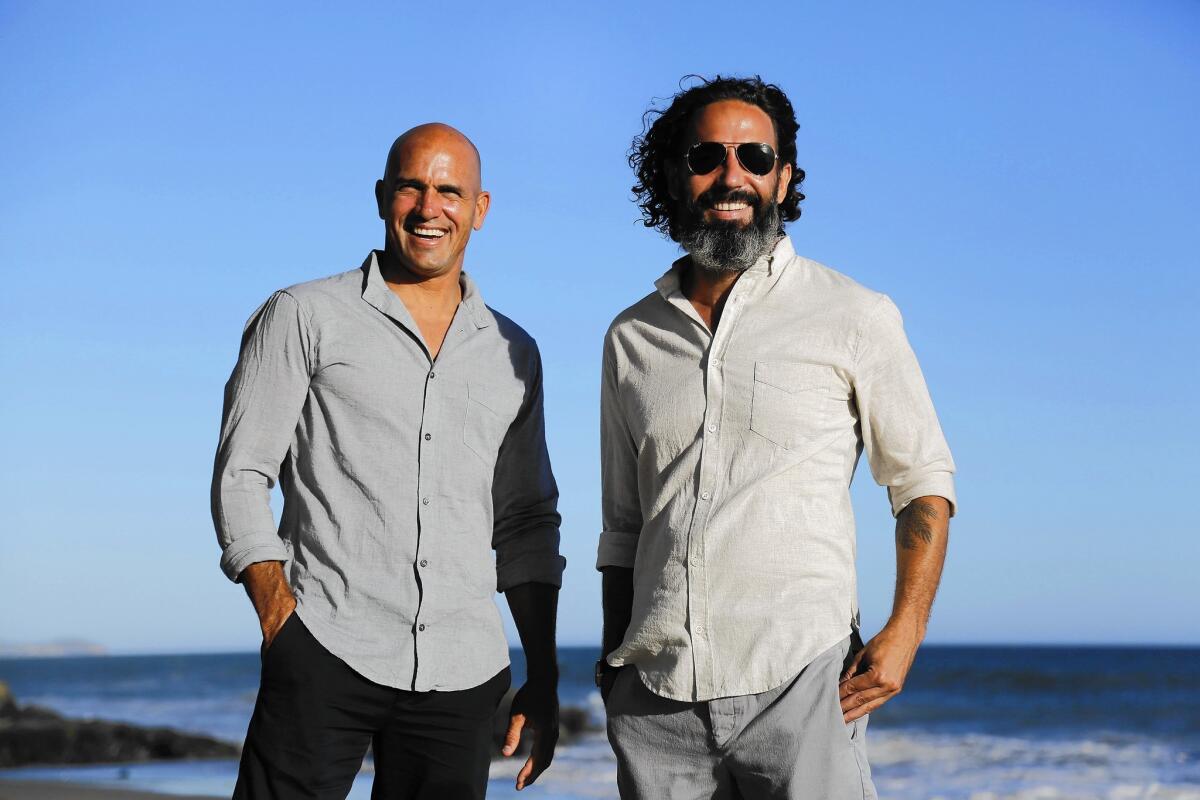Surfer Kelly Slater launches a sustainable (but not inexpensive) clothing line

- Share via
Kelly Slater, an 11-time world champion surfer — and perhaps the best professional surfer the planet will ever see — is a hard man to pin down. The proudly nomadic 43-year-old is constantly on the move, chasing waves around the globe, shuttling between homes in Florida, Hawaii, Australia and a friend’s place in Southern California. Scheduling a sit-down interview — about his own clothing line, no less — is a monthlong exercise in logistics that requires working around tide patterns, competition schedules and launch parties.
The clothing label, Outerknown, which launched in mid-July, is just as hard to get a bead on. It mixes surf roots, luxury prices and a really-easy-to-say but harder-to-explain founding principle of “sustainability.”
We eventually did get a chance to chat with Slater — in advance of a World Surf League event in San Clemente — and Outerknown’s creative director John Moore (whose other projects include retro-surf label M.Nii). In the spirit of the label’s stripped back aesthetic, here’s a stripped-back crib sheet with all you need to know about Outerknown:
What is it?
A surf-inspired menswear label that eschews bright colors, bold patterns and overt logos. “We’re surfers that grew up with surf brands,” says Moore. “But the key is we grew up.” The coastal casual collection includes T-shirts, button-fronts, relaxed trousers and shorts as well as lightweight outerwear pieces all made in runs of less than 300 pieces. Fabrics include organic cotton, hemp, wool and a recycled nylon called Econyl made from recovered fishing nets. The theme of the debut collection is “a clean slate,” hence a color palette grounded in navy blue, black and heather gray.
Where did it come from?
Some of the ideas that made their way into Outerknown began to percolate a few years ago when Slater and Moore first worked together on VSTR, a short-lived label under the Quiksilver umbrella. Slater, a Quiksilver-sponsored athlete for almost 24 years, ended that endorsement deal in early 2014.
“I like a challenge. I like something to work toward,” Slater says. “And I wanted to challenge the ethos of how you look at things, and [I wanted to] learn about them. My primary source of income for almost 30 years of my life has been through endorsements of clothing and products, and if you were to ask me the nuts and bolts of how things run and where things come from, I didn’t know.” This, Slater says, was one of the biggest reasons for creating his own line from the ground up.
Who‘s behind it?
Co-founded by Slater and Moore, the Culver City-based label is privately held. But one minority investor worth mentioning is Kering, the Paris-based luxury group whose brands include Balenciaga, Gucci and Stella McCartney. Moore says Kering came on board about a year into the development process as a “strategic partner.”
What’s the big deal?
In an era of increasing eco-consciousness, Outerknown isn’t the first brand to use sustainability as a selling point. But with Slater’s vision (not to mention a social media following that includes 1.2 million Instagram followers, 466,000 on Twitter), Moore’s track record of creating covetable and comfortable clothes, and the determination of both to build the brand slowly and transparently, it’s a label with a lot going for it. In addition, the grown-up-surfer-meets-sustainability approach comes at a time when more traditional surf labels struggle to stay relevant as their heavily teen markets turn to other interests. (These include Quiksilver, which last week filed for bankruptcy protection).
What, exactly, does “sustainable” mean?
Sustainability is the decidedly unsexy — but important — fundamental principle of the brand. Moore says for Outerknown it incudes several different aspects of bringing the clothes to market. The label has partnered with the Fair Labor Assn., agreeing to abide by its code of conduct regarding working conditions throughout its supply chain. It’s also partnered with a company called Bluesign to eliminate harmful substances in the manufacturing process.
“And then there’s the materials story itself,” says Moore, “And that’s where things like Econyl and regenerated wool come in.”
Econyl is a textile made from recycled pre- and post-consumer Nylon 6, a material found in certain recycled fishing nets, the top pile of industrial carpet and moldings left over from the furniture manufacturing process. Regenerated wool, Moore explains, comes from collecting and recycling cast-off fiber from factory floors in the initial manufacturing process.
In addition, garment tags and hangtags are water-soluble, partly a way to eliminate unnecessary waste and partly a nod to Moore and Slater’s mutual hatred of logos and branding.
What’s with the $98 T-shirts?
With hemp/organic cotton T-shirts that retail for $98, recycled nylon board shorts (for $125) and regenerated wool peacoats ($545), Outerknown’s debut collection seems to have more of an impact on the wallet than the planet. “If we were just going after a business opportunity, we would have just named it ‘Kelly Slater’ and taken it to the mass market to sell $30 T-shirts,” Moore said, “But that sustainability adds to the cost.”
Also affecting the price is the size of the fledgling brand. “It’s the economy of scale,” Moore explains, “for 100% of our collection we’re making 300 pieces or less, which is expensive. Once we’re able to order more, the cost will go down.”
“Yeah, there’s been some ‘sticker shock,’ I guess you could call it,” says Slater, “But I think part of that is that people were expecting traditional surf-label prices.”
Where can you buy it?
Local stockists include Ron Herman at Fred Segal Center on Melrose, Tradesman in Venice, Wittmore’s two L.A locations, as well as online via luxury e-tailer Mr. Porter and Outerknown’s own website outerknown.com
What’s next?
A spring and summer 2016 men’s collection (“The theme is ‘just add water,’ ” says Moore) is set to hit retail in January. Future plans include a women’s collection (though the original idea of launching for resort 2015 has been scuttled), travel bags and accessories suitable to Slater’s peripatetic lifestyle and eventually, a more wallet-friendly product offering (that still hews to the sustainability tenet).
“We do intend to make a line that’s more surf-retail ready, the kind of basics I wear all the time, once the economy of scale kicks in,” Slater says.
For Moore, the ultimate goal is to completely close the loop when it comes to pieces like the Econyl puffer jackets and board shorts.
“The thing about Nylon 6 is that it can be endlessly regenerated,” he says. “Once we’re big enough to go back to our suppliers with big enough orders to get things like button snaps and zippers made out of the same Nylon 6 as the textiles, the entire garment can be endlessly regenerated without any loss of quality.”
It depends on how fast we grow,” says Moore, “but I hope we can get there in the next few years.”







